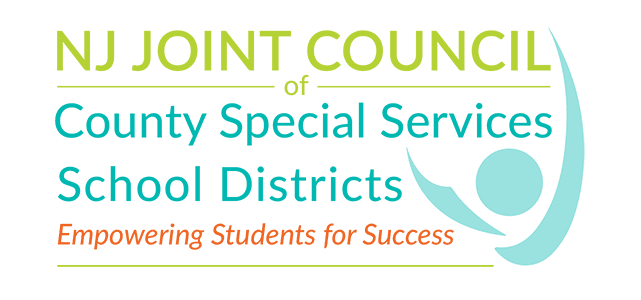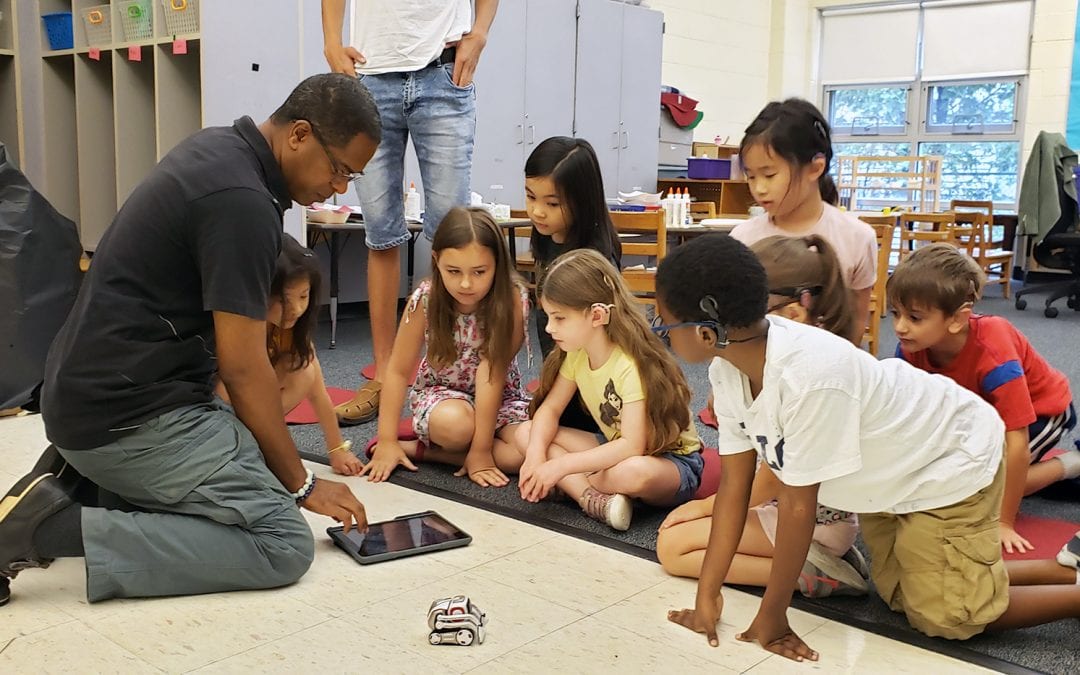Students from Bergen County Special Services School District engage in a STEM lesson using robotics.
“Collectively, as the Joint Council, we are sharing best practices and expertise to support the standards outlined in the Deaf Student’s Bill of Rights,” Dr. Howard Lerner, chairman.
“An uphill battle” is how Jen Hansbury, a Teacher of the Deaf with Gloucester County Special Services School District, described efforts to gain “acceptance and access” for the Deaf and hard of hearing community.
She pointed to a dearth of qualified interpreters and noted that New Jersey did not officially recognize American Sign Language (ASL) until 1995.
But, Hansbury and her colleagues throughout New Jersey’s special services school districts, who have long advocated on behalf of Deaf and hard of hearing students and families, now see a clearer path for this population toward acceptance, access and equal opportunities. Such optimism is the result of new state legislation passed over the summer.
New Jersey has established a Deaf Student’s Bill of Rights that directs school districts throughout the state to “screen and assess hearing and vision capabilities and communication and language needs at the earliest possible age” in students’ educational journeys, and to provide “individualized and appropriate early intervention” when needed.
The new law establishes standards for providing Deaf and hard of hearing students with the best possible educational experiences, which include awareness of and access to professionals and specialized programs across the state. Members of the New Jersey Joint Council of County Special Services School Districts are prepared to meet these high standards, and many are hopeful about growing their programs for Deaf and hard of hearing students as awareness of the population’s needs increases.
Providing Choices for Students and Families
Bergen County Special Services School District runs the state’s largest and most comprehensive programs for Deaf and hard of hearing youth and their families. Principal Kathleen LoCascio says that the district’s breadth of programming gives families the power of choice – something the Deaf Student’s Bill of Rights emphasizes.
“We offer two tracks: one is for total communication, so if a family chooses to have a child utilize total communication, we can support that through this track,” LoCascio explained. “Another is an auditory and spoken language track for those families who choose a listening and spoken language outcome in their child’s education.” She hopes that the Deaf Student’s Bill of Rights leads to greater awareness of parents’ options to select or blend approaches to best meet the needs of their child, and the growth of programming to match such preferences.
“Our administration has created a model program, where a continuum of philosophies and approaches to educating Deaf and hard of hearing students is offered. Our goal is to honor cultures and choices for families associated with American Sign Language, total communication and listening and spoken language throughout the programs,” she said. “We intertwine them to provide customized programs based on students’ needs utilizing the most current research and technology in the field of Deaf education.”
Inspiring a Culture Shift
At the other end of the state — where the population is not as dense, but the need for Deaf and hard of hearing support is just as important — the Cape May County Special Services School District is in its first few months of incorporating a new Teacher of the Deaf (TOD), Carly Benson, into its scope of related services to support students with disabilities.
“We had one student who needed a sign language interpreter, and then that quickly grew to four students,” said Assistant Superintendent Jamie Moscony. “We hired a TOD consultant and realized that we needed a full-time TOD to meet the needs of both our students and those in districts throughout our county.”
Although Benson just started with the district this academic year, her supervisor, Jonathan Price, director of related services, says she is already at capacity. She is offering in-class teacher consultation; direct services for students; and itinerant services for sending districts, including feedback for addressing auditory and linguistic needs in a comprehensive setting.
Benson is also teaching ASL at Cape May County Technical High School. She involves her Deaf and hard of hearing students in some of those classes as she works to build greater understanding and acceptance of Deaf culture.
“We are increasing cultural awareness and teaching acceptance to create an inclusive environment,” said Benson. “We know that this is critical for helping our Deaf and hard of hearing students thrive, and the experts who helped influence the new Deaf Student’s Bill of Rights noted that importance as well.”
Providing Support for Sending Districts
Gloucester County Special Services School District, through its partner organization, the Center for Regional Education Support Services (CRESS), is one of the largest providers of Deaf and hard of hearing services in the southern part of the state. This model of bundling services through CRESS has helped the district not only build upon the services offered within the special services district, but also support the needs of area school districts.
According to CRESS Director Kathleen Monti, the organization was founded over 20 years ago with the intention to foster an environment of collaboration to offer services of the highest quality with a cost savings. “We work with districts as part of their teams and bring some of the top service providers in the area to the table to support students,” said Monti. “Our reputation is one of consistency in terms of our quality and our communication, and that has allowed us to continue to grow.”
Today, CRESS provides Deaf and hard of hearing support with four itinerant TODs, two in-classroom TODs, one educational audiologist, more than 30 educational interpreters, high school and elementary school Deaf programs, and consultative services for area school districts, including for evaluations.
Monti said CRESS is always looking for ways to continue to expand and broaden its services. The organization recently began offering sign language classes to the community, with 30 to 40 attendees in each class, and it is offering some family trainings. Next up, it wants to partner with a college to increase training opportunities for interpreters.
Looking to the Future
“The passing of the Deaf Student’s Bill of Rights gives each county special services school district the opportunity to showcase its adaptability to meet growing needs for services, including trainings,” said Dr. Howard Lerner, chairman of the New Jersey Joint Council of County Special Services School Districts and superintendent of Bergen County Special Services School District. “Each special services district is customer service-oriented, meaning each is willing to adjust services to meet the evolving needs of students, families and its area school districts. Collectively, as the Joint Council, we are sharing best practices and expertise to support the standards outlined in the Deaf Student’s Bill of Rights.”
Rasheda Garcia, an itinerant Teacher of the Deaf with the Educational Services Unit of the Burlington County Special Services School District, hopes that the Joint Council can even make an impact through its efforts to increase awareness of the Deaf Student’s Bill of Rights.
“As parents and school districts learn about the legislation, we will hopefully get the support we need to provide the range of services that best meet a student’s unique needs,” Garcia said. “We can begin to change the mindset of districts to recognize that Deaf education is varied – you will never find two people with the same profile. It’s also important, because hearing is not just about the ears; it’s about the brain and how the brain processes information. It’s complicated to address and requires specific resources to ensure that Deaf and hard of hearing students have equal shots at success.”

